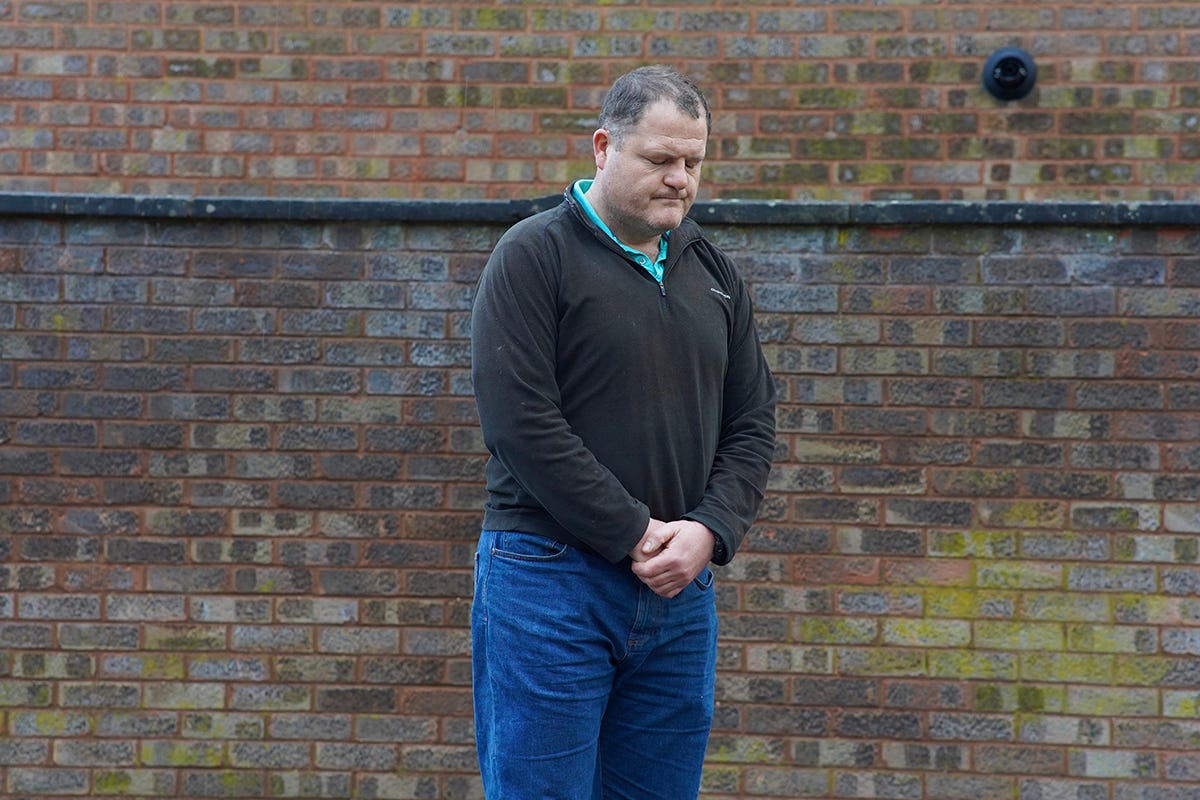Jts5665
Shared posts
Election betting site Polymarket takes victory lap after being more accurate than the polls

I didn't know if we could trust them, nobody knew if we could trust them.
THE HECK? Documents show FEMA official ordered workers to ignore houses with Trump signs

If true, jail is probably in order for at least one person.
Science Shock: U.K. Met Office is “Inventing” Temperature Data from 100 Non-Existent Stations
Shocking evidence has emerged that points to the U.K. Met Office inventing temperature data from over 100 non-existent weather stations. One such 'ghost' station, Dungeness, closed in 1986 but still reports "observations".
The post Science Shock: U.K. Met Office is “Inventing” Temperature Data from 100 Non-Existent Stations appeared first on The Daily Sceptic.
The New York Department of Environmental Conservation raided a man's home to seize and then euthanize his internet-famous pet squirrel, Peanut

This is your government at work, people.
UPDATE — Jena Griswold knew voting machine passwords were visible, made no public statement, did not issue order to change passwords.
Some Canadian doctors now regret euthanizing patients just because they were poor, obese, or depressed

Canadian doctors are starting to regret euthanizing their non-terminally ill patients.
“Why We Influenced the 2020 Elections”: Facebook Files Reveal the Coordinated Effort to Bury the Laptop Story
 Recently, I spoke at an event about my book, “The Indispensable Right,” at the National Constitution Center in Philadelphia. Appearing on the panel with me was a New York University professor and one of the Facebook board members directing “content moderation.” We had a sharp disagreement over the record of Meta/Facebook on censorship, which I described as partisan and anti-free speech. Now, Congress has released the internal communications at Facebook, showing an express effort to appease Biden officials by censoring the Hunter Biden laptop story before the election.
Recently, I spoke at an event about my book, “The Indispensable Right,” at the National Constitution Center in Philadelphia. Appearing on the panel with me was a New York University professor and one of the Facebook board members directing “content moderation.” We had a sharp disagreement over the record of Meta/Facebook on censorship, which I described as partisan and anti-free speech. Now, Congress has released the internal communications at Facebook, showing an express effort to appease Biden officials by censoring the Hunter Biden laptop story before the election.
In a new report released by the House Judiciary Committee’s Subcommittee on the Weaponization of Government, Facebook executives are shown following the lead of the FBI, which gave them prior warnings to prepare to spike such stories before the election. The FBI knew that the laptop was authentic. They had possession of the laptop, and American intelligence concluded that it was not Russian disinformation.
One Microsoft employee wrote, “FBI tipped us all off last week that this Burisma story was likely to emerge,”
However, these communications also show a knowing effort to appease Biden and Harris and effectively assist them in their election efforts. Facebook’s then-Vice President of Global Affairs Nick Clegg reportedly wrote to Vice President of Global Public Policy Joel Kaplan, “[o]bviously, our calls on this could colour the way an incoming Biden administration views us more than almost anything else.”
One of the most interesting communications came from a Facebook employee who recognized that they would be accused of seeking to influence the election: “When we get hauled up to [Capitol] [H]ill to testify on why we influenced the 2020 elections, we can say we have been meeting for YEARS with USG [the U.S. government] to plan for it.”
The Facebook files go beyond influencing the election. At one point, Nick Clegg, the company’s president of global affairs, asked, “Can someone quickly remind me why we were removing—rather than demoting/labeling—claims that Covid is man made.” The Vice President in charge of content policy responded, “We were under pressure from the administration and others to do more. We shouldn’t have done it.”
Notably, Democrats opposed every effort to seek this information, and Facebook only recently relented in turning over its files years after Elon Musk ordered the release of the “Twitter files.” I raised this issue during the NCC event to counter the glowing self-appraisal of Meta over its record. Despite its claims of transparency, it refused calls from many of us for years to release these files. When finally forced by the House to do so, CEO Mark Zuckerberg made a perfunctory apology and moved on. As shown at the NCC event, it is now spinning its record as a defense of free speech.
Jonathan Turley is the Shapiro professor of public interest law at George Washington University and the author of “The Indispensable Right: Free Speech in an Age of Rage.”
Powerful Groups Are Hiding Facts About Illegal Voting by Non-Citizens
 Credit: NYCStock/Shutterstock.com
Overview
Massive government-funded media outlets and other information powerbrokers are keeping Americans in the dark about the prevalence of illegal voting by non-citizens.
They are doing this by betraying a core rule of honest journalism: “No story is fair if it omits facts of major importance or significance.”
Such deceitful reporting is impairing the integrity of the U.S. electoral system by enabling illegal voting to go unchecked. This fraud negates the votes of U.S. citizens, thus usurping their Constitutional right to vote.
Background
In May 2024, Just Facts published an eye-opening study which found that roughly:
Credit: NYCStock/Shutterstock.com
Overview
Massive government-funded media outlets and other information powerbrokers are keeping Americans in the dark about the prevalence of illegal voting by non-citizens.
They are doing this by betraying a core rule of honest journalism: “No story is fair if it omits facts of major importance or significance.”
Such deceitful reporting is impairing the integrity of the U.S. electoral system by enabling illegal voting to go unchecked. This fraud negates the votes of U.S. citizens, thus usurping their Constitutional right to vote.
Background
In May 2024, Just Facts published an eye-opening study which found that roughly:
- 2 to 5 million non-citizens are illegally registered to vote in the United States.
- 1.0 to 2.7 million of them will illegally vote in the 2024 presidential and congressional elections unless better anti-fraud measures are implemented.
- NPR and the BBC, two of the world’s largest taxpayer-funded media outlets.
- the Brennan Center for Justice at NYU School of Law, a non-profit liberal legal powerhouse that had $109 million in revenues during 2023.
- NewsGuard, an organization that partners with government agencies like the State Department, Department of Defense, and World Health Organization to allegedly “counter misinformation for readers, brands, and democracies.”
- The authors of the 2014 paper, published by the academic journal Electoral Studies, foresaw and refuted that argument in an appendix of the study.
- Critics attacked the 2014 paper without acknowledging—much less addressing—the facts that appeared in its appendix and five other publications that rebutted their argument.
- Their argument is inapplicable to Just Facts’ study, which is based on data from a 2022 survey in which “multiple citizenship questions” were asked to “limit the possibility of honest mistakes by survey respondents.”
- 100% of the data on non-citizen voter registration is from a 2022 survey.
- one of the study’s formulas uses data from the 2014 study to calculate a denominator, and if this figure were affected by the error that critics imagine, it would actually decrease the non-citizen voter registration rate.
- a statement from Richman in which he admitted that he tried to “minimize the risk that the estimate could be biased upwards” for a “court case,” thus creating “an increased risk that the estimate could be biased downwards.”
- an extensive appendix by Just Facts that details how the 1% figure is based on narrow or distorted measures that underestimate the rate of non-citizen voter registration.
- It’s “not possible to draw statistical conclusions from a relatively small number of survey participants”—when in fact—the survey in Just Facts’ study is large enough to measure statistically significant nationwide results with at least 95% confidence.
- The survey “does not constitute a representative sample of the population—when in fact—the evidence suggests it does.
- Just Facts is merely a “website”—when in fact—it is a research and educational institute that has been cited, complimented, and commended by a diverse array of scholars, peer-reviewed journals, major media outlets, government entities, and think tanks.
- Just Facts is a “pro-Trump” organization—when in fact—it recently published an article that refutes Trump’s false claims about violent crime, a post that critiques his plan for “tax cuts,” and a video documenting that he contributed to inflation.
- “Investigations into voter rolls show very few immigrants registered to vote and even fewer voting”—when in fact—the ability to vet the rolls is severely limited by lax voter registration laws, rampant identity fraud among illegal immigrants, and the refusal of certain states and the Biden administration to release data on the citizenship status of voters.
The Vice President’s Radical Plan to Tax Unrealized Capital Gains
What’s the most radical part of Kamala Harris’ agenda?
I’m tempted to say it’s what she has said about wanting the Marxist notion of “equality of outcomes.” 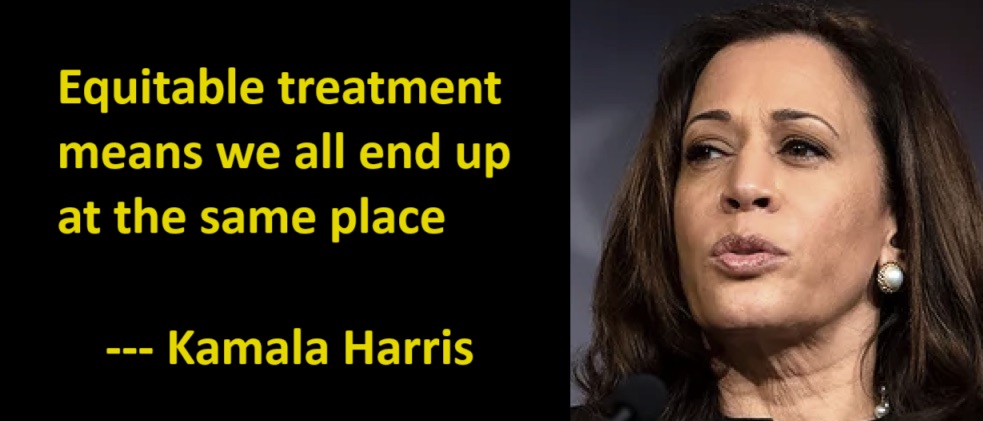
But I suspect (or hope!) that’s just empty campaign rhetoric.
If we look at the specific ideas she has proposed, she was definitely radical when she rain in 2020, embracing crazy ideas like the Green New Deal and Medicare for All.
For the most part, she has been more cautious this year. She has a leftist agenda, but it’s mostly focused on incremental statism, such as partial price controls, more redistribution, and higher corporate tax rates.
But she has one idea that is breathtakingly bad. She wants the IRS to tax unrealized capital gains, which means that if you own an asset that increases in value from one year to the next, the government would tax that difference.
I opined about the Harris proposal for the U.K.-based Telegraph newspaper. I started by warning that both presidential candidates have been furiously trying to buy votes (last month, I wrote that this is America’s “Santa Claus election”).
Election years can be dangerous because politicians have extra incentive to push bad policies. Donald Trump has floated all sorts of gimmicky tax cuts, such as ending taxes on tips, Social Security, and overtime pay.
…Needless to say, Trump has not proposed a single penny of savings on the spending side of the budget. To the contrary, he actually wants to further expand the burden of government. …What about Kamala Harris? She’s also playing Santa Claus, having proposed several trillion dollars of additional redistribution spending. She intends to finance some of that new spending with various class-warfare taxes such as higher personal tax rates and higher business tax rates.
I then explain that one of her tax increases is the radical scheme to tax gains that exist only on paper.
…Harris is also proposing to impose a 25 per cent tax on unrealised capital gains. If an affected taxpayer owns an asset that increases in value from Year 1 to Year 2, that “gain” would be subject to the 25 per cent tax even though nothing has been sold and the taxpayer doesn’t have any additional money.
I give five reasons why her proposal is absurd.
First, it will reduce investment, which will reduce productivity, which will reduce wages.
…it is bad for workers to impose higher taxes on investment and entrepreneurship. The Veep’s proposed tax on unrealised gains would exacerbate the US tax code’s bias against saving and investment… This means less money being set aside to finance productivity-enhancing inventions, innovations, and industry.
Second, the plan would dramatically increase the complexity of a tax code that already is a convoluted nightmare:
…the tax would be an administrative nightmare. Taxpayers and the Internal Revenue Service would have to squabble every year over the value of a taxpayer’s assets. …Tax lawyers and accountants are probably salivating at the thought of this plan becoming law.
Third, it is disturbingly close to a punitive wealth tax:
…a tax on unrealised capital gains could be viewed as a backdoor wealth tax. …The only difference is that it would be a tax on changes in wealth rather than a tax on the stock of wealth.
Fourth, it is so radical that no other country has made this mistake:
…no nation in the world has ever tried to impose a tax on unrealised gains. Even hard-core Leftist governments such as Venezuela have never contemplated such an intrusive and destructive levy.
Fifth, Harris says only rich taxpayers will be affected, but experience teaches us that it will merely be a matter of time before others are hit as well.
…supporters of the tax claim that it would only apply to…less than 1 per cent of the population. That may sound reassuring to ordinary voters … until they realise that the first income tax back in 1913 also applied to less than 1 per cent of households. Yet that “tax on the rich” eventually morphed into the monstrous internal revenue code.
The bottom line is that there should not be any capital gains tax. It’s a very destructive form of double taxation. As such, the Harris plan to expand this destructive levy is a “nutty idea.”
P.S. A lot of my lefty friends are upset that the Washington Post is not endorsing Harris. My personal theory is that the owner, Jeff Bezos, is very aware that the Vice President’s plan would be very bad for his personal finances and (since we already know he seeks to protect his money) he has rationally responded.
P.P.S. One of the worst features of the capital gains tax is that there’s no protection against inflation, so politicians win from bad monetary policy. That unfair policy will be exacerbated by the Harris proposal.
The Biden-Harris Administration Wasted Nearly $1 Billion on Misinformation
The Biden-Harris Administration Wasted Nearly $1 Billion on Misinformation
by Ian Miller at Brownstone Institute

The party of "Science" apparently misled hundreds of millions of people on the actual science surrounding the Covid-19 pandemic. Stop the presses.
Starting in early 2020, the combined efforts of Dr. Anthony Fauci, the CDC, the Department of Health and Human Services, and their partners in the media caused an untold amount of damage to society and public health and might have even created conditions for increased Covid spread. How? By repeatedly, profoundly, and often purposefully communicating inaccurate information while spending hundreds of millions of dollars to get their preferred messages across.
Now, a new, massive 113-page report from the US House of Representatives Energy and Commerce Committee has detailed the remarkable abuses from the Biden-Harris administration and the manner in which they communicated during Covid.
Biden, CDC Partners Literally Wasted a Fortune to Lie to the American People
The report details a number of unbelievable inaccuracies in 2021 coming from the Biden administration's communications team and the CDC's messaging apparatus. Fauci and Francis Collins' National Institutes of Health were also responsible, creating guidance using taxpayer money, nearly $1 billion per the report, that misled millions of people and caused unimaginable harm in the process.
While the Biden-Harris administration’s public health guidance led to prolonged closures of schools and businesses, the NIH was spending nearly a billion dollars of taxpayer money trying to manipulate Americans with advertisements—sometimes containing erroneous or unproven information. By overpromising what the Covid-19 vaccines could do—in direct contradiction of the FDA’s authorizations—and over emphasizing the virus’s risk to children and young adults, the Biden-Harris administration caused Americans to lose trust in the public health system," Committee Chair Cathy McMorris Rodgers (R-WA) said after the report's release. "Our investigation also uncovered the extent to which public funding went to Big Tech companies to track and monitor Americans, underscoring the need for stronger online data privacy protections."
One of the most damaging, and woefully incorrect messaging campaigns centered on vaccine efficacy against infection. As the report details, Biden's "Stop the Spread" campaign was a pervasive marketing effort in conjunction with the CDC that claimed vaccines would end the pandemic by reducing infections. That had enormous knock-on effects, including decreasing trust in all vaccinations and ultimately harming public health.
"The entire premise of the Biden-Harris ‘Stop the Spread’ campaign was that if you got vaccinated for COVID-19, you could resume daily activities because they said vaccinated people would not spread the disease," said Subcommittee on Oversight and Investigations Chair Morgan Griffith (R-VA). "Despite lacking scientific basis, the administration bought into this CDC claim and misled the American public. As a result, vaccination coverage with other vaccines appears to have declined, I believe because of a growing distrust of information coming from our public health institutions."
This campaign was even more disingenuous and purposefully misleading than previously realized. The "Stop the Spread" publicity blitz hid in plain sight a message from the CDC that even they didn't know whether the vaccines actually stopped infection or transmission. The report shared a screenshot of a page from the Biden administration's marketing that specifically said "science" wasn't sure how well the vaccines worked against infection.

Yet the Biden administration made life-altering policy decisions such as vaccine mandates, discriminatory entry processes, and military vaccination requirements regardless. And that was in addition to the less quantifiable impacts like nudging millions of people to follow their preferred course of action.
CDC Guidance Exacerbated Existing Problems
The report also explains how the Biden administration relied heavily on guidance from the CDC, an organization that thoroughly disgraced itself during the pandemic. There were several examples highlighted, chief among them that CDC “experts” went far beyond what even the FDA claimed Covid vaccines could do.
Without evidence, the report says Biden's marketing claimed that “COVID vaccines were highly effective against transmission.” Within just a few months, it was clear that all the available evidence pointed towards the exact opposite direction. Per the report, this had a “negative impact on vaccine confidence and the CDC’s credibility when proven untrue.”
The CDC also had “inconsistent and flawed messaging about the effectiveness of masks,” which created seemingly endless mandates and, again, overconfidence in an ineffective policy. Some of those mandates even continue to this day.
That's just the tip of their misinformation. A wealth of data and public embarrassments for the CDC confirmed that the organization “consistently overstated the risk of COVID-19 to children," the report states. That fear-mongering had disastrous consequences, from unnecessarily terrifying parents to prolonged school closures and lack of socialization—setting an entire generation of children back in the process.
Still, after being repeatedly and profoundly proven wrong, the CDC has demonstrated they've yet to learn their lesson. In late 2024, the CDC continues to recommend Covid-19 vaccines for babies starting at six months old. That makes the US a global outlier compared to European nations that have maintained at least some level of intellectual honesty.
How Do We Fix CDC Abuses?
The report detailed several recommendations to fix these organizations after their disastrous work during the pandemic. Even implementing just a select few, listed below, would do wonders for fixing the institutional rot that influenced these mistakes.
- Congress should consider clarifying responsibility for evaluating the safety of vaccines and streamlining existing reporting systems for capturing vaccine injuries and adverse reactions.
- HHS and its agencies should embrace a culture of transparency and accountability.
- The CDC and federal public health officials should not attempt to silence dissenting scientific opinions.
Also highlighted in the report is how the CDC and NIH used their weight in their attempts to censor scientists who dissented from their preferred narratives. Beyond their mistakes, profound inaccuracies, and nearly unlimited spending, their censorship efforts are equally concerning.
As we learned during Covid, if there's one thing “experts” hate, it's being told that they were proven wrong. Instead of learning, adjusting, and apologizing, they move to censor, criticize and mislead. This new report is the latest confirmation of these unacceptable “mistakes." And reaffirms the importance of ensuring they never happen again.
Republished from the author's Substack
The Biden-Harris Administration Wasted Nearly $1 Billion on Misinformation
by Ian Miller at Brownstone Institute - Daily Economics, Policy, Public Health, Society
Just 11% of ‘Flu’ Cases Are Caused by Influenza. No Wonder the Vaccines Don’t Work
Just 11% of 'flu' cases are caused by the influenza virus – no wonder the vaccines don't work, say Tom Jefferson and Carl Heneghan. But it's convenient for politicians and pharma companies to convince us they do.
The post Just 11% of ‘Flu’ Cases Are Caused by Influenza. No Wonder the Vaccines Don’t Work appeared first on The Daily Sceptic.
How the Democrats Rigged the Vote in Puerto Rico
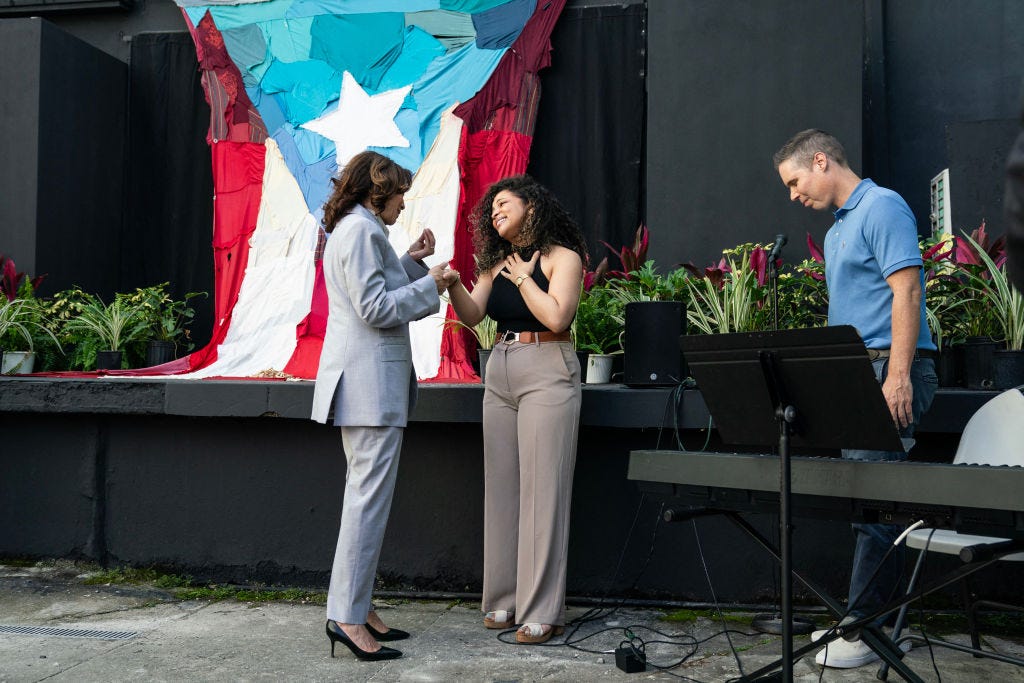
On Tuesday, November 5, Americans will go to the polls and choose their next president. We can only hope there will be no allegations of vote-rigging.
There is, however, one group of U.S. citizens who already knows their vote will be rigged. I’m referring to the 3.2 million residents of Puerto Rico. (My maternal grandparents migrated from Puerto Rico in the 1950s.) Because Puerto Rico is a “commonwealth” of the United States, rather than a state, Puerto Ricans cannot vote in federal elections. But they do get to vote in local elections, which this year includes a nonbinding referendum on the island’s political status—the seventh such referendum in its history.
When they walk into the polling booth on Election Day, Puerto Ricans will be offered three possibilities: (1) statehood, (2) complete independence from the U.S., and (3) sovereignty that includes an ongoing association with the United States. What they will not see is the option of maintaining the status quo.
In previous referendums, the status quo—remaining a commonwealth—has been among the most popular options. So why would the latest referendum suddenly exclude this option? Because the Democratic Party, in concert with Puerto Rico’s pro-statehood party, have designed it that way. There is no other way to describe it: They have rigged the vote to give the statehood option a decisive advantage—and they have done it in plain sight.
Dr. Jay’s Slam Dunk: Blacklisted Scientist Receives Prestigious Award for “Intellectual Freedom”

Below is my column in the New York Post on the prestigious award given to Stanford Professor Dr. Jay Bhattacharya last week and what it has to say about those who censored, blacklisted, and vilified him for the last four years. In celebrating his fight for “intellectual freedom,” the National Academy effectively condemned those who joined the mob against him as well as the many professors who stayed silent as he and others were targeted.
Here is the column:
Few in the media seemed eager to attend a ceremony last week in Washington, D.C., where the prestigious American Academy of Sciences and Letters was awarding its top intellectual freedom award.
The problem may have been the recipient: Stanford Professor Dr. Jay Bhattacharya.
Bhattacharya has spent years being vilified by the media over his dissenting views on the pandemic. As one of the signatories of the 2020 Great Barrington Declaration, he was canceled, censored, and even received death threats.
That open letter called on government officials and public health authorities to rethink the mandatory lockdowns and other extreme measures in light of past pandemics.
All the signatories became targets of an orthodoxy enforced by an alliance of political, corporate, media, and academic groups. Most were blocked on social media despite being accomplished scientists with expertise in this area.
It did not matter that positions once denounced as “conspiracy theories” have been recognized or embraced by many.
Some argued that there was no need to shut down schools, which has led to a crisis in mental illness among the young and the loss of critical years of education. Other nations heeded such advice with more limited shutdowns (including keeping schools open) and did not experience our losses.
Others argued that the virus’s origin was likely the Chinese research lab in Wuhan. That position was denounced by the Washington Post as a “debunked” coronavirus “conspiracy theory.” The New York Times Science and Health reporter Apoorva Mandavilli called any mention of the lab theory “racist.”
Federal agencies now support the lab theory as the most likely based on the scientific evidence.
Likewise, many questioned the efficacy of those blue surgical masks and supported natural immunity to the virus — both positions were later recognized by the government.
Others questioned the six-foot rule used to shut down many businesses as unsupported by science. In congressional testimony, Dr. Anthony Fauci recently admitted that the 6-foot rule “sort of just appeared” and “wasn’t based on data.” Yet not only did the rule result in heavily enforced rules (and meltdowns) in public areas, the media further ostracized dissenting critics.
Again, Fauci and other scientists did little to stand up for these scientists or call for free speech to be protected. As I discuss in my new book, “The Indispensable Right,” the result is that we never really had a national debate on many of these issues and the result of massive social and economic costs.
I spoke at the University of Chicago with Bhattacharya and other dissenting scientists in the front row a couple of years ago. After the event, I asked them how many had been welcomed back to their faculties or associations since the recognition of some of their positions.
They all said that they were still treated as pariahs for challenging the groupthink culture.
Now the scientific community is recognizing the courage shown by Bhattacharya and others with its annual Robert J. Zimmer Medal for Intellectual Freedom.
So what about all of those in government, academia, and the media who spent years hounding these scientists?
Biden Administration officials and Democratic members targeted Bhattacharya and demanded his censorship. For example, Rep. Raja Krishnamoorthi (D-Ill.) attacked Bhattacharya and others who challenged the official narrative during the pandemic. Krishnamoorthi expressed outrage that the scientists were even allowed to testify as “a purveyor of COVID-19 misinformation.”
Journalists and columnists also supported the censorship and blacklisting of these scientists. In the Los Angeles Times, columnist Michael Hiltzik decried how “we’re living in an upside-down world” because Stanford allowed these scientists to speak at a scientific forum. He was outraged that, while “Bhattacharya’s name doesn’t appear in the event announcement,” he was an event organizer. Hiltzik also wrote a column titled “The COVID lab leak claim isn’t just an attack on science, but a threat to public health.”
Then there are those lionized censors at Twitter who shadow-banned Bhattacharya. As former CEO Parag Agrawal generally explained, the “focus [was] less on thinking about free speech … [but[ who can be heard.”
None of this means that Bhattacharya or others were right in all of their views. Instead, many of the most influential voices in the media, government, and academia worked to prevent this discussion from occurring when it was most needed.
There is still a debate over Bhattacharya’s “herd immunity” theories, but there is little debate over the herd mentality used to cancel him.
The Academy was right to honor Bhattacharya. It is equally right to condemn all those who sought to silence a scientist who is now being praised for resisting their campaign to silence him and others.
Jonathan Turley is the Shapiro professor of public interest law at George Washington University and the author of “The Indispensable Right: Free Speech in an Age of Rage.”
Islam’s supercessionism on steroids; etymology of “bureaucracy”
Jts5665"government by desks"
(a) I overheads an interview (by Caroline Glick) with a Jewish online Arabic and English teacher who recounts his discussions in Arabic with Muslims online.
One thing really stuck out: a girl from [East-]Jerusalem who told him the first Temple was actually the first Al-Aqsa Mosque [!], built by Suleiman, who was actually a Muslim after all! [Yeah, and was reincarnated as Neil Peart ;)]
He goes on to explain that Islamic theology makes a distinction between the Banu Izrail, who were the chosen people as long as they were [proto-]Muslims (!) — and the Yahud who were those of the B”I who strayed from the true path and corrupted the Tawrat/Torah. This is how you can find Muslims named after Jewish prophets who nevertheless hate Jews.
[And yes, there are exceptions: some of his Muslim online buddies did not make this distinctions, and I know of a handful of Islamic clerics who do not either, such as “the Zionist Imam” Ahmed al-Adwan in Jordan, Sheikh Abdulhazi Palazzi in Italy, and the “Reform Imam” Tawhidi in Australia. Wikipedia, caveat lector as always, has an entry on “Muslim Zionism“.]
But the “mainstream” position is really a “version on steroids” of the early Christian (originally Catholic) concept of supercessionism (a.k.a. “replacement theology”): the Jews of the Old Testament (a.k.a. Tanakh) were the Old Israel, and the One Holy Catholic [=literally: universal] and Apostolic Church was the New Israel, and the old Covenant is superceded by the New Covenant.
Starting with the 2nd Vatican Council, and especially under Pope John-Paul II, the Catholic Church has turned away from this towards a kind of dual-covenant theology (i.e., for Jews and Jews only, the Old Covenant is still in force).
Islam, of course, sees itself as superceding both Judaism and Christianity.
(b) Who’s actually running the USA, wonders John Richardson. An unaccountable bureaucracy?
Now who actually came up with this term, “bureaucracy”? Turns out, it goes back to the same Frenchman who coined the term “laissez-faire” economics, Jacques Vincent de Gournay. (1712-1759).
Gournay was appointed an intendant du commerce in 1751. One of the main themes of his term in office was his opposition to government regulations because of what he saw as the way they stunted commerce. He coined the term bureaucratie (literally “government by desks”) to describe the situation.[4] Gournay’s disdain for government regulation of commerce influenced his disciple Turgot.[5]
Fitness app Strava, used by Secret Service, gives away location of Biden, Trump and Kamala.
Jts5665oops
She Was Arrested for Praying in Her Head

Emma has strong feelings about abortion: She wears T-shirts that say things like “Pro-life and Proud.” A devout Catholic, she is a trustee of a pro-life activism group and regularly holds planning meetings at her flat in Edinburgh, Scotland. On her way to work at an office in the center of town, the 24-year-old passes the abortion facility at nearby Chalmers Hospital. Sometimes, she prays with rosary beads as she walks by.
But now she’s worried she could get arrested in her neighborhood—for wearing that T-shirt, for holding those meetings, or even for praying in her head.
On October 4, Emma, who asked not to be named, got a letter from the Scottish government. Addressed “Dear Resident,” its purpose was to alert her that her home, due to its proximity to the hospital, is now in an abortion censorship zone.
This is due to the UK’s brand-new “Safe Access” law, which came into effect September 24 and made it a criminal offense to do anything within 200 meters of an abortion facility that could “influence” someone’s decision to access, provide, or facilitate an abortion. In the Scottish government’s letter, Emma read that even “activities in a private place (such as a house) within the area could be an offence if they can be seen or heard within the Zone and are done intentionally or recklessly.”
“You can report a group or an individual that you think is breaking the law,” the letter added, before providing instructions on how to do so.
Emma couldn’t believe her eyes. The law carries a maximum fine of £10,000 (over $13,000). In June, it passed in The Scottish Parliament by 118 votes to one, following in the footsteps of Northern Ireland, which became the first country in the UK to enforce abortion censorship legislation last year. The rest of the UK is doing the same: On October 31, a similar law will come into effect in England and Wales; it was passed by Parliament in 2023. In these countries, the fine will be unlimited.
All of this legislation codifies—on a national level—a trend that has been creeping across the UK for a decade. Ten years ago, in 2014, Parliament empowered local councils to create and police their own antisocial behavior laws. The intention was to enhance “the professional capabilities and integrity of the police.” But since 2018, five UK districts have used these powers to aggressively limit what people can do, say, and even think, near abortion clinics. I spoke to four people who have fallen afoul of these restrictions, and a disturbing pattern emerged.
In November 2022, Adam Smith-Connor, now 51, a physiotherapist and veteran, was interrogated by local authorities in Bournemouth, on the south coast of England, which had recently introduced an abortion censorship zone. His alleged crime was silently praying for three minutes while 50 meters from an abortion clinic. When council officers asked, “What is the nature of your prayer?” he replied: “I am praying for my son who is deceased,” referring to his unborn child that he and his then-girlfriend decided to abort two decades ago.
Smith-Connor was charged with breaching the censorship zone. Earlier this month, on October 16, he was convicted and ordered to pay £9,000 (roughly $11,700) toward the prosecution’s legal fees. He set up a page on a crowdfunding website, which raised the fee within hours. He and the lawyer supporting him are considering an appeal.
The same day, also in Bournemouth, the trial of Livia Tossici-Bolt was due to begin. The retired scientist, who’s 64, faces the same charges as Smith-Connor, but her alleged offense is standing outside an abortion clinic in March 2023 with a sign that simply read: “Here to talk, if you want.” (Her trial was postponed to March 2025, to give both legal teams time to consider the implications of Smith-Connor’s verdict.)
Around the same time, in Birmingham—the UK’s second-largest city—Isabel Vaughan-Spruce, 47, was arrested for silently praying outside an abortion clinic. (More about her case later.)
Watch Vaughan-Spruce tell her story below:
Meanwhile Father Sean Gough, 34, was charged with two counts of silent prayer in the same city, as well as parking near an abortion clinic with an “Unborn lives matter” bumper sticker, and holding a sign that read: “Praying for free speech.”
And just over a year ago, in October 2023, a pro-life volunteer named Patrick Parkes, 57, was praying silently outside an abortion clinic in Birmingham when police threatened him with a fine.
Their instruction to him? “Kindly move elsewhere outside the exclusion zone where you’ve got your human rights.”
Study finding no benefits from puberty blockers is left unpublished for political reasons, after receiving $9.7 million in federal funds

Studies that reach politically inconvenient conclusions are sometimes buried. A researcher found that giving transgender kids puberty blockers doesn’t improve their mental health, but she hasn’t published the results, because they undermine the case for transitioning kids from one gender to another. She’s keeping the results hidden even though she received $9.7 million from the […]
The post Study finding no benefits from puberty blockers is left unpublished for political reasons, after receiving $9.7 million in federal funds appeared first on Liberty Unyielding.
Climate-change course now required for college degree at UC San Diego
Jts5665Religious studies requirements...

Starting this fall, a course in climate change is required for all incoming students at the University of California San Diego. The “Jane Teranes Climate Change Education Requirement” will help students learn about the “fundamental challenge that we face in the university [or] on this planet in the coming hundred years,” Professor Sarah Gille tells […]
The post Climate-change course now required for college degree at UC San Diego appeared first on Liberty Unyielding.
NPR asks why the communist regime of Cuba can't keep the lights on 🤔
Jts5665Inconceivable...

When the answer is there - right there, right within grasping distance - and they just can't get it:
We got another Babylon Bee prophecy fulfilled ✊

I have to admit, this was a killer headline from The Babylon Bee and it nearly made me spit out my coffee.
Wyoming has found a way to mitigate forest fires: Stop blowing up dead horses

Wyoming is having a bit of a dry spell, and the dangers of natural fires have forced their forest rangers to give up a long-held practice.
Wyoming congresswoman urges parents to oppose language conditioning for transgender ideology
‘Gaps And Inconsistencies’: Up To $41 Billion In World Bank Climate Handouts Unaccounted For, New Report Finds
Jts5665Shocker.

By Owen Klinsky Up to $41 billion of the funds distributed to climate causes by the World Bank between 2017 and 2023 are unaccounted for due to poor accounting standards, according to an audit from Oxfam International published Thursday. The enormous sum represents almost 40% of the climate funds the Bank disbursed during the seven […]
The post ‘Gaps And Inconsistencies’: Up To $41 Billion In World Bank Climate Handouts Unaccounted For, New Report Finds appeared first on Liberty Unyielding.
Real Violent Crime Trends
 Artiom Photo/Shutterstock.com
Overview
Kamala Harris, Joe Biden, media outlets, and so-called “fact checkers” are claiming that “violent crime is near a 50-year low.” In contrast, Donald Trump is alleging that “crime is worse than it’s ever been.”
The reality is that all of them are wrong.
There are three key measures of violent crime with various strengths and weaknesses, but the most reliable and severe one shows that the murder rate in 2023 was 36% higher than the modern low in 2014 but 14% lower than the modern peak in 2021.
FBI Data
The statistics cited by Harris and others who declare that violent crime is extraordinarily low come from the FBI’s Uniform Crime Report, which is based on voluntary reports of crimes by state and local law enforcement agencies. As explained by the FBI, this report “excludes” crimes like “sexual assault,” “simple assault,” “attempted robberies,” and “crimes not reported to law enforcement.”
Regarding the last of those exclusions, the FBI discloses that “changes in police procedures, shifting attitudes toward crime and police, and other societal changes can affect the extent to which people report and law enforcement agencies record crime.” Thus, the FBI cautions against “making any direct comparison between data in this publication and those in prior” years.
If one ignores that warning—and all of the crimes not recorded in the Uniform Crime Report—violent crime appears to be near a 50-year low:
Artiom Photo/Shutterstock.com
Overview
Kamala Harris, Joe Biden, media outlets, and so-called “fact checkers” are claiming that “violent crime is near a 50-year low.” In contrast, Donald Trump is alleging that “crime is worse than it’s ever been.”
The reality is that all of them are wrong.
There are three key measures of violent crime with various strengths and weaknesses, but the most reliable and severe one shows that the murder rate in 2023 was 36% higher than the modern low in 2014 but 14% lower than the modern peak in 2021.
FBI Data
The statistics cited by Harris and others who declare that violent crime is extraordinarily low come from the FBI’s Uniform Crime Report, which is based on voluntary reports of crimes by state and local law enforcement agencies. As explained by the FBI, this report “excludes” crimes like “sexual assault,” “simple assault,” “attempted robberies,” and “crimes not reported to law enforcement.”
Regarding the last of those exclusions, the FBI discloses that “changes in police procedures, shifting attitudes toward crime and police, and other societal changes can affect the extent to which people report and law enforcement agencies record crime.” Thus, the FBI cautions against “making any direct comparison between data in this publication and those in prior” years.
If one ignores that warning—and all of the crimes not recorded in the Uniform Crime Report—violent crime appears to be near a 50-year low:
 Trump claims that “the FBI defrauded everybody because what they did is they used statistics not including some of the worst areas and some of the worst cities.” This simply isn’t true, even in light of the fact that the FBI stealthily revised its 2022 crime data, which is accounted for in the chart above.
Contrary to Trump, the FBI provides “statistics for the entire United States” by including “estimated” crime numbers for law enforcement agencies that don’t report data to the FBI. This creates uncertainty, but agencies who submitted data to the FBI in 2023 covered 94.3% of the U.S. population and “every city agency” covering a million or more people.
On the other hand, the FBI has been burying crime data since the outset of the Biden administration, and this has led to some massive underreports of violent crime. For a prime example, NewsNation reported in 2022 that 14,677 murders occurred in 2021 based on the FBI’s convoluted presentation of its data. This was 8,000 fewer murders than the FBI’s actual estimate of 22,900 murders that year.
To rectify this problem, Just Facts has posted the FBI’s Uniform Crime Reports for 2020/2021, 2022, and 2023 at easily accessible permalinks. The FBI has buried these datasets in a fragmented manner under a maze of vaguely worded dropdown menus and acronyms with expiring hyperlinks.
Reports for earlier years are still readily available from the FBI.
DOJ Data
Another common source of violent crime data is the National Crime Victimization Survey (NCVS), which is conducted by the Department of Justice. In the words of an academic book published by the National Academies of Sciences, Engineering, and Medicine, this survey “is widely viewed as a ‘gold standard for measuring crime victimization’.”
Nevertheless, the book warns that the NCVS is “beset with methodological problems of surveys in general as well as particular problems associated with measuring illicit, deviant, and deleterious activities….”
The survey is based on a statistically powerful nationally representative sample of 160,000 people, but it doesn’t measure “homicide, arson, commercial crimes, and crimes against children under age 12.”
Also, it includes simple assaults in its violent crime rates, which commonly involve no injuries or minor ones.
Like the FBI data, the NCVS shows large declines in violent crime since the early 1990s, but it greatly differs from the FBI data in recent years and shows an apparent 37% increase in violent crime from 2020 to 2023:
Trump claims that “the FBI defrauded everybody because what they did is they used statistics not including some of the worst areas and some of the worst cities.” This simply isn’t true, even in light of the fact that the FBI stealthily revised its 2022 crime data, which is accounted for in the chart above.
Contrary to Trump, the FBI provides “statistics for the entire United States” by including “estimated” crime numbers for law enforcement agencies that don’t report data to the FBI. This creates uncertainty, but agencies who submitted data to the FBI in 2023 covered 94.3% of the U.S. population and “every city agency” covering a million or more people.
On the other hand, the FBI has been burying crime data since the outset of the Biden administration, and this has led to some massive underreports of violent crime. For a prime example, NewsNation reported in 2022 that 14,677 murders occurred in 2021 based on the FBI’s convoluted presentation of its data. This was 8,000 fewer murders than the FBI’s actual estimate of 22,900 murders that year.
To rectify this problem, Just Facts has posted the FBI’s Uniform Crime Reports for 2020/2021, 2022, and 2023 at easily accessible permalinks. The FBI has buried these datasets in a fragmented manner under a maze of vaguely worded dropdown menus and acronyms with expiring hyperlinks.
Reports for earlier years are still readily available from the FBI.
DOJ Data
Another common source of violent crime data is the National Crime Victimization Survey (NCVS), which is conducted by the Department of Justice. In the words of an academic book published by the National Academies of Sciences, Engineering, and Medicine, this survey “is widely viewed as a ‘gold standard for measuring crime victimization’.”
Nevertheless, the book warns that the NCVS is “beset with methodological problems of surveys in general as well as particular problems associated with measuring illicit, deviant, and deleterious activities….”
The survey is based on a statistically powerful nationally representative sample of 160,000 people, but it doesn’t measure “homicide, arson, commercial crimes, and crimes against children under age 12.”
Also, it includes simple assaults in its violent crime rates, which commonly involve no injuries or minor ones.
Like the FBI data, the NCVS shows large declines in violent crime since the early 1990s, but it greatly differs from the FBI data in recent years and shows an apparent 37% increase in violent crime from 2020 to 2023:
 Given sampling margins of error, the NCVS violent crime rate may have risen by as little as 12% to as much as 69% from 2020 to 2023. Regardless, this is a sizeable disconnect from FBI statistics, which show a 6% decrease in the violent crime rate from 2020 to 2023.
Murder Data
The only measure of violent crime that transcends the vagaries of FBI and NCVS data is murder. Although counts of murders exclude all lower-level crimes, they capture the harshest and best-measured one.
Per a 2010 DOJ report, “Homicide is of interest not only because of its severity but also because it is a fairly reliable barometer of all violent crime. At a national level, no other crime is measured as accurately and precisely.”
There are two primary measures of murder—the FBI’s Uniform Crime Report and death certificate data compiled by the CDC. As explained in a 2014 DOJ report, death certificates provide “more accurate homicide trends at the national level than” FBI data because:
Given sampling margins of error, the NCVS violent crime rate may have risen by as little as 12% to as much as 69% from 2020 to 2023. Regardless, this is a sizeable disconnect from FBI statistics, which show a 6% decrease in the violent crime rate from 2020 to 2023.
Murder Data
The only measure of violent crime that transcends the vagaries of FBI and NCVS data is murder. Although counts of murders exclude all lower-level crimes, they capture the harshest and best-measured one.
Per a 2010 DOJ report, “Homicide is of interest not only because of its severity but also because it is a fairly reliable barometer of all violent crime. At a national level, no other crime is measured as accurately and precisely.”
There are two primary measures of murder—the FBI’s Uniform Crime Report and death certificate data compiled by the CDC. As explained in a 2014 DOJ report, death certificates provide “more accurate homicide trends at the national level than” FBI data because:
- the reporting of death certificates is “mandatory,” while the FBI relies on “voluntary” reports “from individual law enforcement agencies that are compiled monthly by state-level agencies.”
- death certificates include homicides that “occur in federal jurisdictions,” while the FBI rarely counts “homicides occurring in federal prisons, on military bases, and on Indian reservations.”
- death certificates include homicides caused by the deliberate “crashing of a motor vehicle, but this category generally accounts for less than 100 deaths per year.”
- justifiable homicides by civilians acting in self-defense, which are not murders.
- some justifiable homicides by police, even though these are supposed to be coded as “legal intervention deaths,” not as homicides.
 While ignoring the fact that correlation does not prove causation, many media outlets and Democrats have blamed the surge in murders in 2020 on Covid-19 and Trump. In reality, the facts point to the BLM movement as the most likely cause. The same applies to the murder surge in 2015.
Conclusion
Violent crime is a serious issue, and in the case of murder, deadly serious. Yet, prominent Democrats, Republicans, and media outlets are all misleading the public about this problem that impacts a large portion of Americans.
A 1987 DOJ study based on crime data from 1974 to 1985 found:
While ignoring the fact that correlation does not prove causation, many media outlets and Democrats have blamed the surge in murders in 2020 on Covid-19 and Trump. In reality, the facts point to the BLM movement as the most likely cause. The same applies to the murder surge in 2015.
Conclusion
Violent crime is a serious issue, and in the case of murder, deadly serious. Yet, prominent Democrats, Republicans, and media outlets are all misleading the public about this problem that impacts a large portion of Americans.
A 1987 DOJ study based on crime data from 1974 to 1985 found:
- 42% of Americans will be the victim of a completed violent crime (assault, robbery, or rape) in the course of their lives.
- 83% of Americans will be the victim of an attempted or completed violent crime.
- 52% of Americans will be the victim of an attempted or completed violent crime more than once.
The Debanking of America
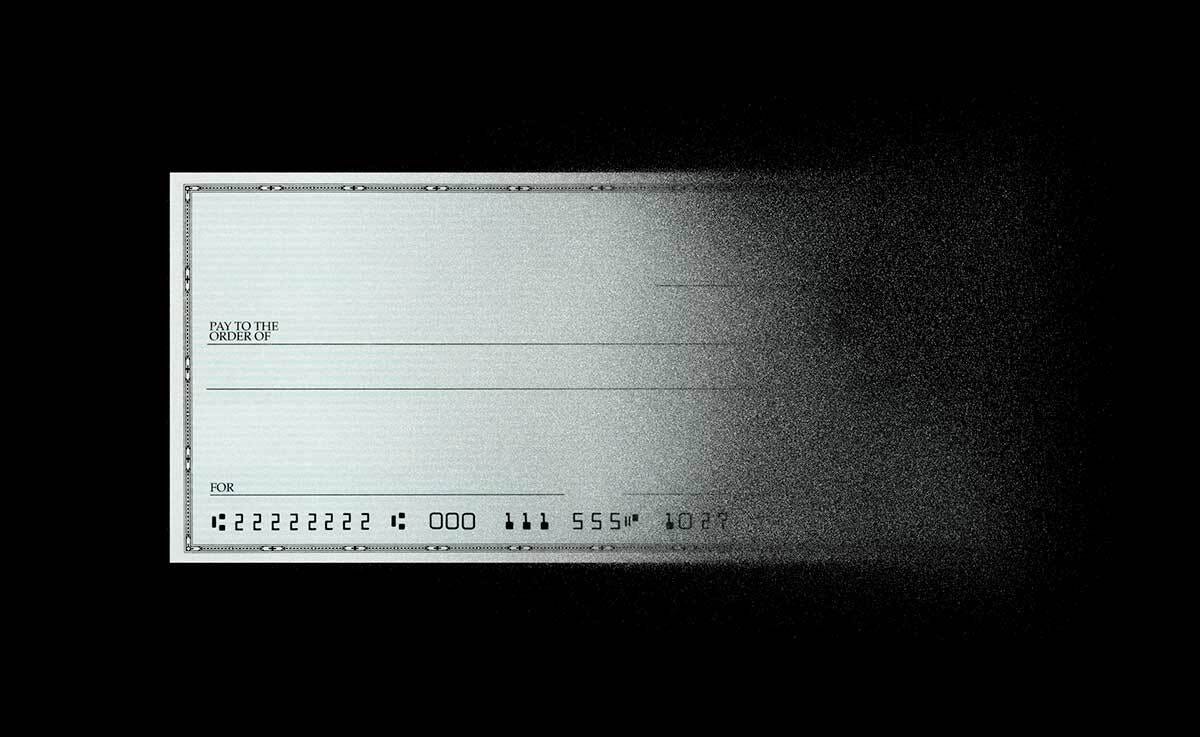
On February 6, 2019, Chris Abdur-Rahman Blauvelt, the founder of the crowdfunding platform LaunchGood, received an email from the payment processor Stripe.
“We are glad to have worked alongside LaunchGood as you have grown throughout the years,” Nicole Arboleda, a sales leader in Stripe’s Platform Partnerships division, said in the email that was shared with The Free Press. “However with that growth has come additional scrutiny from our financial partners, as you are aware.”
She continued: “Over the last year our risk and financial crimes team have worked to the best of our ability to remediate these issues. However due to the continued use of workarounds that are not supported by our financial partners, we unfortunately can no longer support your organization.” (Blauvelt said Arboleda did not share any further information.)
Being unable to process payments would make running his crowdfunding platform impossible. So Blauvelt, now 40, left a family vacation in Florida to fly to Stripe’s San Francisco headquarters to straighten things out.
A dozen people, mostly from Stripe’s compliance division, were waiting in a conference room. Blauvelt explained that LaunchGood, which crowdsources donations for Muslim charities around the world, was all about things like providing food aid in Syria, clean drinking water in Gaza, flood relief in Bangladesh, and so forth.
Blauvelt, who was born in Malaysia to a Protestant family, converted to Islam as a teenager. He knew the unspoken concern of those in the room. As he told me, he explained to Stripe, “We’re not terrorists. We’re trying to bring humanity together.”
Stripe’s Arboleda told Blauvelt it was out of their hands: Stripe’s banking partner, Wells Fargo, had made the call to cut ties. She said that was all she knew—and, in fact, it was all she was allowed to know. Banking laws prevented banks from disclosing their reasons for severing ties with customers.
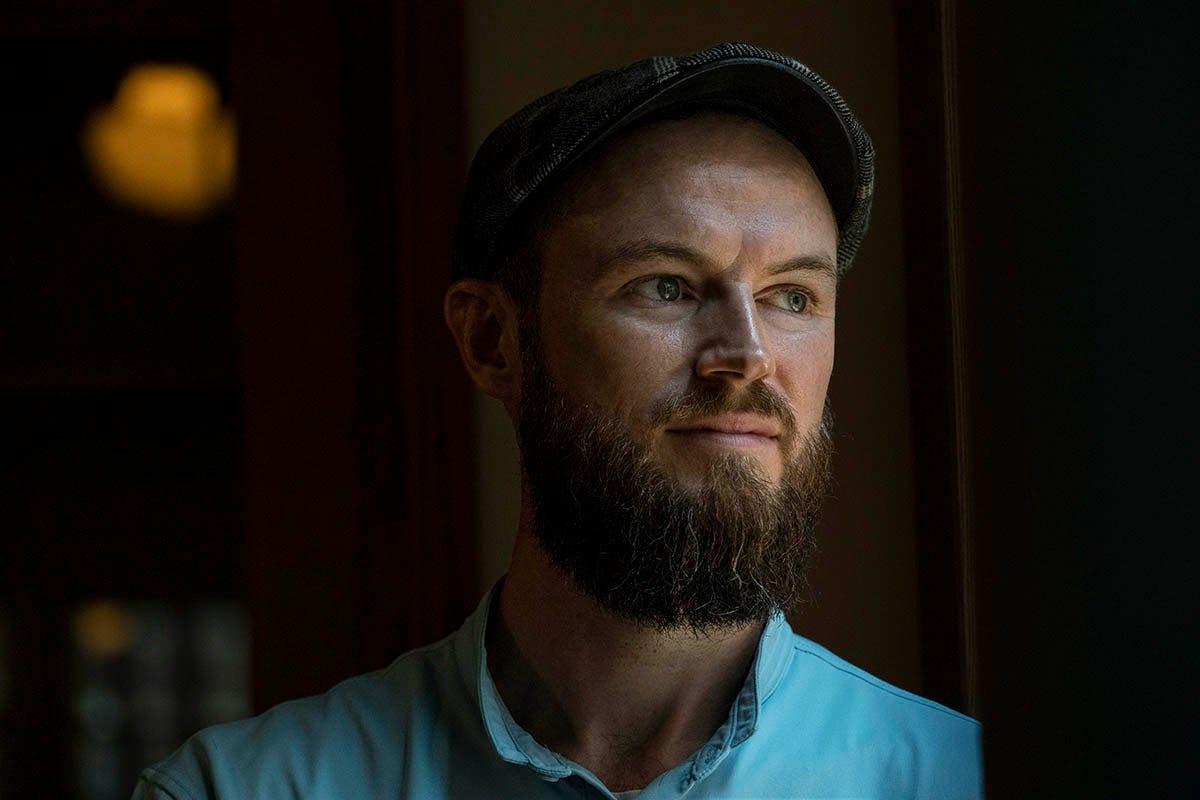
Blauvelt co-founded LaunchGood in 2013. That year, users donated $1.3 million on the site. Over the next several years, that figure jumped—to $3 million in June 2015, and then $34.4 million in December 2018. To date, Blauvelt said, users have raised more than $660 million on his site. He couldn’t believe the bank was about to destroy everything he had built.
Blauvelt was convinced that Wells Fargo was worried about funds on LaunchGood being inadvertently sent to a terrorist organization. He acknowledges there have been concerns about some of the recipients of his funding—for example, Islamic Relief, the biggest Muslim charity in Britain, has been accused by Israeli authorities of funding Hamas. A 2014 audit—paid for by Islamic Relief—found the board did include antisemites who had praised Hamas, the Iranian-backed terror proxy, but that the charity itself had no connection to the group.
Blauvelt texted me: “The U.S. government has repeatedly asked Israel for proof of these baseless allegations and have not been able to get any for years.”
He added, “We understand that we’re held to a higher standard and are subject to greater scrutiny as a Muslim crowdfunding platform, and thus we go above and beyond.”
A Wells Fargo spokesperson did not reply to a request for comment from The Free Press. A spokesman for Stripe said that the company “has a policy against commenting on or sharing the details of any user or review.”
Nothing Blauvelt said mattered. Stripe, in their original email, informed him that he had just weeks to find another payment processor.
In short, LaunchGood had been “debanked.” Debanking, or, as some financial institutions prefer, derisking, refers to a bank cutting ties with a customer deemed politically incorrect, extreme, dangerous, or otherwise out of bounds.
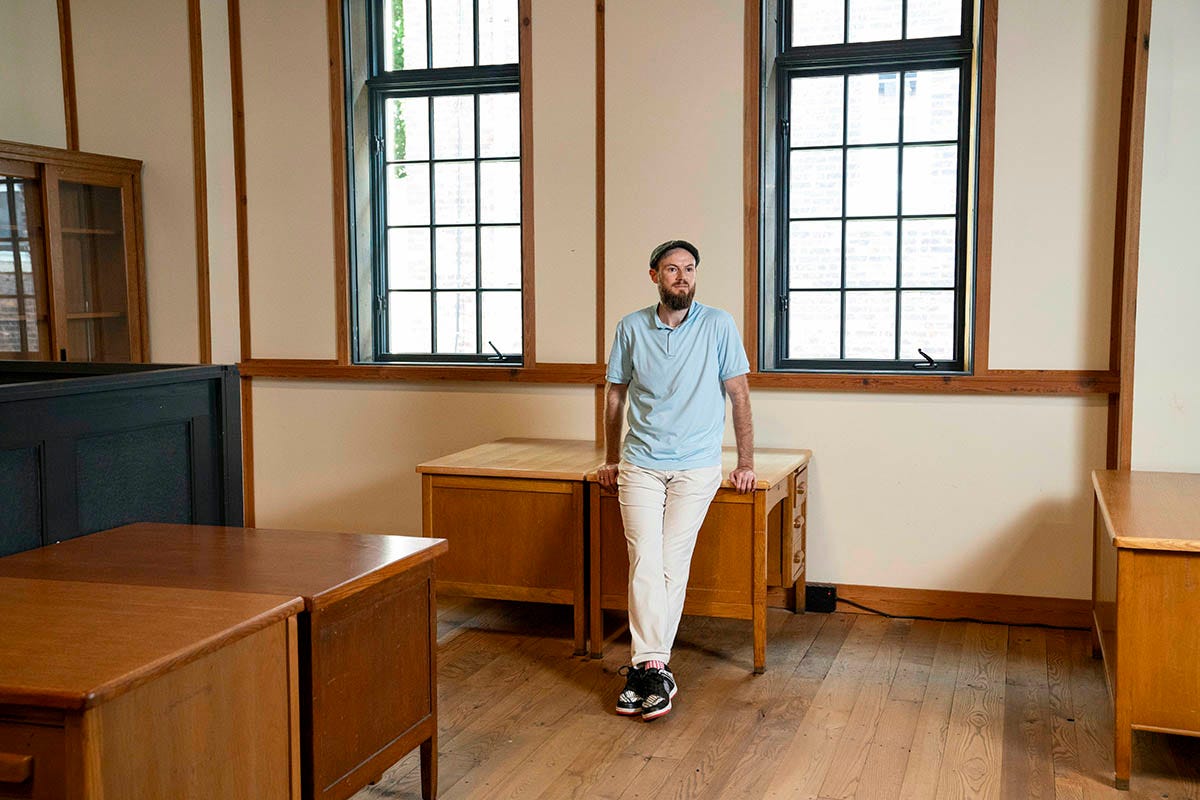
And the list of the debanked, including the famous and obscure, grows by the day.
Former first lady Melania Trump alleges in her new memoir that both she and her son, Barron, were debanked. “I was shocked and dismayed to learn that my long-time bank decided to terminate my account and deny my son the opportunity to open a new one,” she wrote. (Trump’s email provider also declined to continue providing her service.)
Being debanked is a family affair for the Trumps. This includes the former president, Donald Trump, who was shut out of a Florida bank account after the January 6, 2021 storming of the Capitol. So was a news app run by Donald Jr. So was MyPillow CEO (and Trump supporter) Mike Lindell.
But it’s not just Trump supporters. Also debanked have been a number of Christian charities, including Indigenous Advance Ministries, a Memphis-based charity that does philanthropic work for orphans in Uganda, and Family Council, a pro-life charity based in Arkansas. According to Democratic lawmakers, many Arab and South-Asian Americans—who are considered “high risk” because of being Muslim—have been debanked, too.
Nowhere in the Constitution is there a right to banking, although for the vast majority of Americans, it is a staple of everyday life. But as the financial sector, like most every facet of contemporary society, has moved online—and as every major American institution, including banks, have been politicized—banks have felt compelled to monitor their customers’ political and personal lives. They need to be sure that the brands of the people who bank with them jibe with their own, so that they do not upset too many other customers or potential customers.
“Debanking for political or ideological reasons should concern everyone, whatever their politics,” Samuel Gregg, an economist at the libertarian American Institute for Economic Research, told me. “In the first place, if one side does it, the odds are that the other side will play that game. More generally, it reflects a broader problem that characterizes America as a whole: the relentless politicization of everything.”
Lawmakers on both sides of the aisle are increasingly concerned about the severity and capriciousness of the bankers’ decisions.
In February of this year, Democratic senators Elizabeth Warren and Bernie Sanders and representatives Ilhan Omar, Rashida Tlaib, and Ayanna Pressley wrote to Jamie Dimon, the CEO of JPMorgan Chase & Company, voicing concern that debanking “poses a particularly severe threat for customers from the Muslim American community.”
The letter added that the “economic ramifications extend beyond individual consumers and communities in the United States, as de-risking can also undermine the stability and sustainability of countries dependent on remittances and other aid flows for economic development.”
In September, Senator Mike Lee, a Republican from Utah, introduced the Saving Privacy Act. The libertarian Cato Institute explains the bill “would essentially end the practice of requiring banks to act as law enforcement agents and would prevent law enforcement agencies from accessing customers’ financial records without first obtaining a valid warrant.”
It’s unclear exactly how many U.S. citizens—or how much money—have been debanked recently. “That data doesn’t exist,” Todd Zywicki, a bankruptcy law professor at George Mason University’s Antonin Scalia Law School, told me. But we have some idea of the scope of the problem: In January 2016, the Consumer Financial Protection Bureau started to receive complaints from people whose bank accounts had been shut down suddenly and without much reason or notice. To date, there have been more than 15,000 complaints. (A CFPB spokesperson did not reply to a request for comment.)
“In the financial sector, you have layers and layers, one on top of the other, of laws and regulations that were designed to ensure the system is not aiding and abetting any wrongdoing, but now you have the government increasingly using those tools to target not just obvious wrongdoers but political foes,” Zywicki told me. “What banks understand is the government just doesn’t make suggestions. When the government suggests something, everybody understands that’s an order, and that’s how banks respond.”
Amit Sharma, a senior official in the Treasury Department’s Office of Terrorism and Financial Intelligence under then-president George W. Bush, says plenty of innocent people and organizations have been hit.
“Debanking that pulls on your heartstrings the most is debanking legitimate nonprofit organizations or nongovernmental organizations doing humanitarian relief in high-risk places,” Sharma, the current CEO of financial compliance firm FinClusive, told me. “That’s the most egregious, because on the other side of that are people in dire need.”
Nicholas Anthony, an analyst at the Cato Institute, said the cost of debanking now affects most everyone in the United States. “Banks spend tens of billions of dollars complying with government-mandated surveillance, and those costs show up in maintenance fees, service fees, and even interest rates,” Anthony told me. “This is to say nothing of the cost incurred when you are considered too risky to open a new account or keep an existing one. However, because the government has maintained so much secrecy around the process, most Americans don’t even realize this surveillance regime is the source of the problems they face.”
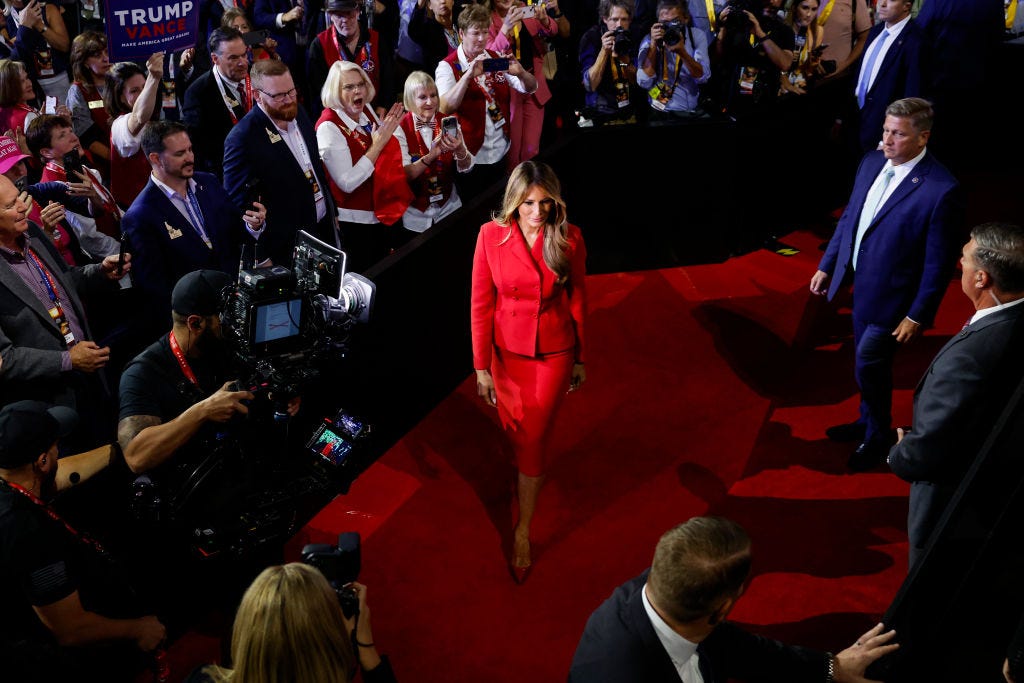
There is a long history of the federal government demanding the financial sector cooperate in stopping crimes such as money laundering and the financing of terrorism.
That stretches back at least to the federal Bank Secrecy Act of 1970, which sharply limits the rights of citizens to financial privacy and protection and bars banks from disclosing their reasons for severing ties with customers. The act has been amended many times over the decades.
Then came the terrorist attacks of September 11, 2001.
Four days after 9/11, newly installed FBI director Robert Mueller was briefing President Bush in the Oval Office. As Mueller described the FBI’s progress in identifying the hijackers, their nationalities and other biographical details, Bush cut him off. “What I want to know from you—today—is what the FBI is doing to prevent the next attack,” he said.
“I felt like a chastened schoolboy who had turned in the wrong homework assignment,” Mueller later recalled.
According to former FBI special agent Thomas J. Baker, this prompted Mueller to launch a dramatic change in FBI culture. Over the next several years, the bureau migrated from its traditional role as a law-enforcement agency to an intelligence-gathering agency. A key metric of success, Mueller said, became the “number of terrorist attacks thwarted.”
That conversation between Mueller and Bush “led to the USA Patriot Act and the beginning of the end of constitutional protections,” George Hill, a former FBI intelligence analyst who has testified before Congress about banks’ handling of the January 6 rioters, told me. The Patriot Act, which Congress passed with bipartisan support in October 2001, gave federal law enforcement vastly increased new powers of surveillance. Any wisp of suspicion of a terrorist tie could lock a business or an individual out of the financial system.
It also beefed up the Bank Secrecy Act, giving Washington greater oversight over everyone in the U.S. financial system—which amounts to pretty much everyone in the country. And it mandated that banks collect more data on their customers—also known as “know-your-customer protocols”—and report any suspicious activities.
Over the years, this machinery, which had in theory been created to stop terrorists from harming Americans, shifted its focus to Americans themselves.
“Under the Bush administration, it was more outward focused and, to the extent Americans were ensnared, it was because they were having communications with foreigners who were under surveillance,” Ilya Shapiro, a constitutional law expert at the Manhattan Institute, told me, referring to the government’s war on terrorism.
That changed with President Barack Obama, Shapiro said.
“Obama turned a lot of that apparatus inwards to go after politically incorrect businesses, where domestic terrorism could be defined to include even people who show up at school board meetings to protest policies,” he explained.
Emblematic of this “inward” approach was Operation Choke Point, which the Obama administration launched in 2013, targeting banks whose clients included legal weapons distributors and payday lenders assumed to be at risk of committing fraud or laundering money.
“The reason that we are focused on financial institutions and payment processors is because they are the so-called bottlenecks, or choke points, in the fraud committed by so many merchants,” Michael Bresnick, the executive director of Obama’s Financial Fraud Enforcement Task Force, said in a 2013 speech.
“Even many people who worry about politicized debanking will be reluctant to be seen as strong defenders of payday lenders,” Gregg, at the American Institute for Economic Research, said. “That, however, illustrates why strong stands against politicized debanking are necessary from the start. Once a precedent for this type of activity is established, people across the political spectrum will feel emboldened to use it to target groups promoting ideas they don’t like.”
In the Obama administration’s final weeks, in January 2017, it expanded the National Security Agency’s powers, making it easier for the agency to share communications with the government’s 16 other intelligence agencies, including the FBI.
Progressives fretted that President-elect Donald Trump would abuse these new powers. But Trump, who had promised on the campaign trail to end the war on terrorism, seemed uninterested in expanding the government’s surveillance powers.
In late August 2017, as the Trump administration was contending with fallout from its handling of the Unite the Right rally in Charlottesville, Virginia, the Department of Justice informed Congress that it was ending Operation Choke Point.
But President Joe Biden has renewed the spirit of Operation Choke Point by expanding the government’s spying operations on American citizens—announcing in June 2021 a “National Strategy for Countering Domestic Terrorism.”
Domestic terrorism, his administration explained in a fact sheet, “has evolved into the most urgent terrorism threat the United States faces today.” It added that the “U.S. Government will enhance domestic terrorism analysis and improve information sharing throughout law enforcement at the federal, state, local, tribal, and territorial levels, and, where appropriate, private sector partners.”
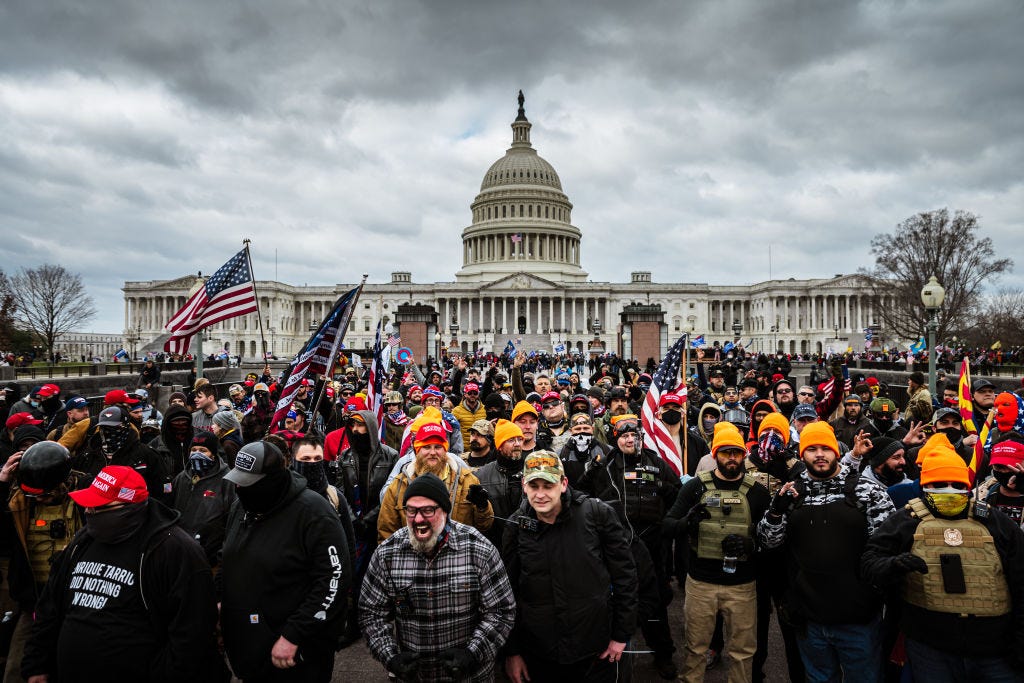
All of which is to say that, when the January 6, 2021 riot happened—the nation still reeling from an election the incumbent president refused to concede, the new president just two weeks away from being sworn in—the stage was set for a wave of debankings never before seen in America.
A few days after the riot, former FBI analyst Hill recalled that his colleague, a special agent focused on counterterrorism, had asked him to take a look at some potentially useful information that might lead to an investigation.
Hill was shocked. The information contained the names of Bank of America customers who had made a purchase with their credit or debit cards in the greater Washington area between January 5 and January 7, 2021, and had previously bought a firearm or ammunition anywhere.
“So, if you went to South Dakota to go pheasant hunting in 1996, you went to the top of that list,” Hill told me.
Hill added that, after speaking with a special agent in the FBI’s Washington Field Office, he learned that Bank of America had volunteered this information. (A Bank of America spokesperson did not reply to a request for comment. The House Judiciary Committee launched an investigation into this matter based on Hill’s whistleblower testimony, as well as others.)
Although it is not known how many January 6 rioters have been debanked, “We’ve seen so many other cases where the process is the punishment,” Hill said. “If they go for the kill shot and tried to completely garner your assets or just crush your life entirely, that’s going to wind up in court, and that’s going to wind up in discovery. The goal is to make your life difficult, so you stop being difficult for us—us being the government.”
It was about this time that a growing number of social conservatives started grumbling—mostly in Facebook chat rooms and elsewhere on social media—about their bank accounts being mysteriously closed.
This included Sam Brownback, the chairman of the National Committee for Religious Freedom, which he founded in 2022. Prior to that, Brownback had spent decades in public life, serving as a Republican U.S. senator from Kansas, the state’s governor, and under Trump, ambassador at large for international religious freedom.
In April 2022, the NCRF opened a business account at a JPMorgan Chase branch in Washington, D.C., Brownback told me. Three weeks later, the bank, without providing any explanation, closed it.
The cancellation had a ripple effect, causing some of the NCRF’s other financial institutions to withdraw their services, threatening the nascent organization’s ability to launch.
After NCRF repeatedly pushed Chase for an explanation for why its account had been terminated, Chase told NCRF that it would consider a reinstatement if “NCRF disclosed donors, provide a list of intended fund recipients for the next election cycle, and the full details of how the NCRF would select pro-religious freedom candidates to support,” according to a synopsis of the calls and emails between NCRF and Chase provided by NCRF. (Chase did not reply to a request for comment.)
NCRF did not comply.
The organization was able to find a new bank. But the experience caused Brownback to make fighting the debanking of people on religious grounds one of the group’s missions. They have given this effort the hashtag #ChasedAway.
As Brownback wrote in a September 27, 2022 letter to JPMorgan Chase CEO Dimon, “We are concerned that religious institutions, houses of worship, and people of all faiths are at risk of having their business, credit, or even personal or private bank accounts terminated for any or no reason at all.”
At Chase’s annual shareholder meeting, on May 16, 2023, Dimon said of the bank’s handling of NCRF: “No apologies are necessary, and no corrective action is necessary.”
Brownback assumed that his experience was typical of a large number of social conservatives—the vast majority of whom, he said, never speak up after they’ve been debanked.
Most people who receive a cryptic, anodyne-sounding email informing them that their account “has undergone a status change,” as Brownback put it, “just went away quietly and found another bank.”
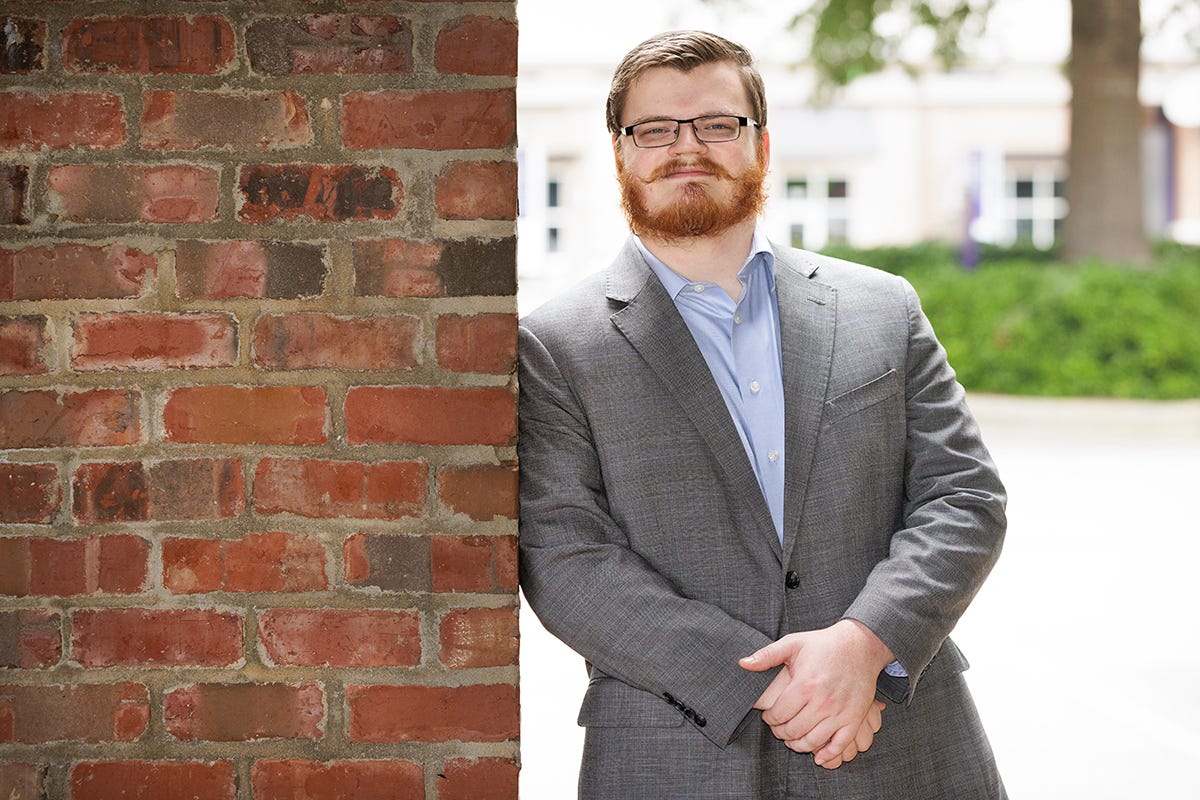
On July 22, 2022, Stephen Horn, a 26-year-old computer programmer who lives with his parents near Raleigh, North Carolina, received a disturbing letter from Truist bank.
“We regret to inform you that we have made a decision to close your account(s) with us as outlined below,” began the letter that Horn showed me. It was sent from the bank’s corporate headquarters in Winston-Salem.
The bank added that this decision had nothing to do with his credit. He had about $20,000 in his account, and he had 30 days to withdraw it. (A Truist spokesperson did not reply to requests for comment.)
Horn immediately guessed—although the banking secrecy laws keep him from confirming—that his activities around the January 6 riot were the reason.
The night before the riot, Horn rode in a chartered bus full of Trump supporters from Raleigh to Pentagon City in Arlington, Virginia. The next morning—January 6—he took the Metro into Washington, D.C., watched the president address his supporters outside the White House, and followed them up to the Capitol.
With a Raspberry Pi camera attached to his skateboard helmet, Horn filmed the mob breaking into the Capitol and Speaker Nancy Pelosi’s office, and delaying a joint session of Congress from counting the Electoral College votes that would formalize Joe Biden’s victory over Trump.
Shortly afterward, Horn posted his video online and photos of him appeared on social media. Tipsters notified the government of his identity. He was interviewed by the FBI and says he gave them his footage to help the government identify lawbreakers.
Horn saw himself as an independent journalist documenting a historic event. But the authorities saw him as a man who went to the Capitol to participate in and film the vandalism. Their view prevailed with the jury that in September 2023 convicted him of four misdemeanor counts, including disorderly conduct in the Capitol. In January, he was sentenced to a year of probation, a $2,000 fine, and 90 hours of community service.
His activities have brought his entire family to the attention of the federal government. In April 2023, Dan Horn, Stephen’s father, flew back to Raleigh from a missionary trip in Nigeria. When Dan arrived at Customs and Border Protection, his name popped up on their computer. “He was explicitly told by a CBP agent that he was flagged for questioning because of me,” Stephen Horn said.
Two weeks later, Customs and Border Protection revoked Dan’s Global Entry status—the “trusted travelers program” that enables frequent, low-risk globetrotters to reenter the United States faster.
Stephen Horn has managed to open a new bank account, although he wouldn’t tell me where. He didn’t think it was a good idea to draw attention to the bank.
Horn has a minimal online presence, and said he is not even a Trump supporter. When I interviewed him about being debanked, he said, “I had heard of corporations in the financial or service sectors banning politically ‘controversial’ individuals, but it had always been people who had much larger platforms and impact.”
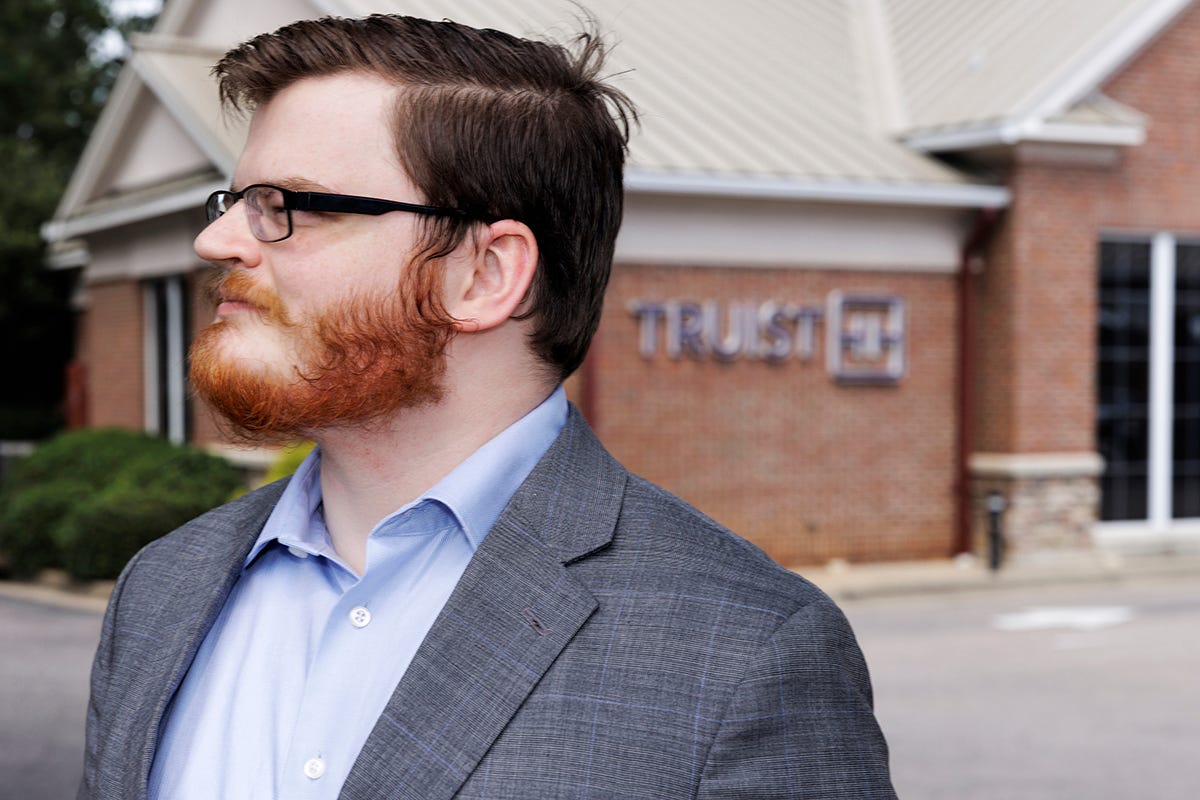
Chris Blauvelt and LaunchGood eventually found a new bank and a new payment-processing company. He doesn’t care to identify them either.
In the post-October 7 world, questions continue to swirl around who LaunchGood funds. The Wall Street Journal reported that Israel questions some of LaunchGood’s recipients, saying they have ties to Hamas. Blauvelt responded that all charities raising money on LaunchGood must “pass three separate compliance checks”—including audits, screening of the people receiving that money, and “continuous monitoring of programs and transactions by our compliance software,” which, he noted, was developed by FinClusive, former Treasury official Amit Sharma’s financial-compliance company.
Blauvelt also says he will not be silenced if he runs into debanking troubles again. “Back when Stripe offboarded us, we didn’t even talk about it publicly for maybe a year or two, because it was so embarrassing,” he said.
So, Blauvelt said, LaunchGood plans—by the end of this year—to launch its own payment processor, PayGood, which will rely on smaller, more inclusive banks. (“Good luck with that,” George Mason’s Zywicki said. He predicted smaller banks would ultimately fall into line with the feds.)
Conservatives, no surprise, insist that it is those who run afoul of the Democratic establishment who are at the greatest risk of being debanked.
“Financial giants like Bank of America and Wells Fargo have a history of ‘debanking’ people who hold political views disfavored by the Biden-Harris administration,” Travis Taylor, a political scientist who has done extensive polling on debanking for the right-wing Florida think tank Foundation for Government Accountability, told me in an email.
All of which points toward an emerging, bipartisan, anti-debanking bloc on Capitol Hill.
“Every American should have the ability to take out a loan or save for their future without fear of discrimination or having their accounts closed without explanation,” Democratic representative from California Ro Khanna told me.
Zywicki told me it would help if those who have been debanked or know others who’ve been shut out of the banking system simply spoke up.
“When debanking happens to someone, they don’t raise a fuss, because what they’re most concerned about is finding a bank account somewhere else and getting back into the financial system,” he said.
Zywicki added: “If you don’t have access to financial services, you basically don’t exist.”
Rupa Subramanya is a reporter for The Free Press. Follow her on X @RupaSubramanya and read her piece “The ‘Giant Grift’ That Swallowed Wall Street—and Maybe Your Savings.”
To support The Free Press, become a subscriber today:

